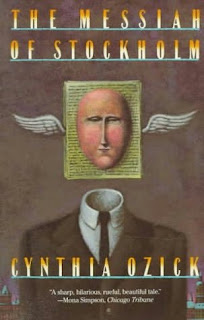The Messiah of Stockholm, by Cynthia Ozick
 A number of the blurbs used to praise this novel refer to its "puzzle"-like nature. Ozick herself is praised as a "magician... a literary alchemist." I know it's just promo copy, but can we agree that these words are by now dead arrows in the critic's quiver, blunted with massive over-use and near constant misuse? I, for one, am tired of reading critics' reviews that make every book that isn't a straight-up lyrical-realist work sound like it's by Borges and García Márquez (maybe "García Bórguez?").
A number of the blurbs used to praise this novel refer to its "puzzle"-like nature. Ozick herself is praised as a "magician... a literary alchemist." I know it's just promo copy, but can we agree that these words are by now dead arrows in the critic's quiver, blunted with massive over-use and near constant misuse? I, for one, am tired of reading critics' reviews that make every book that isn't a straight-up lyrical-realist work sound like it's by Borges and García Márquez (maybe "García Bórguez?").Look, I understand reviewing makes use of a lot of shortcuts that try to establish a code which basically clues the reader into whether they will like it or not. "I like Borges and I like García Márquez, and this sounds like it's a bit of a mindfuck with magical realist elements—okay, I'll buy it." And I mean, who doesn't like García Bórguez?
But we can try a little harder, can't we? Most of the time, when the word "puzzle" is used in a review of a "serious" literary work, it just means that there are things in the plot that are withheld from you-the-reader, and you are encouraged to ponder these plot-related things while reading. But that doesn't mean it's a puzzle—not even in the more metaphorical sense that is willfully applied to Borges. And "magic" and "alchemy" and their various inflections and accoutrements are even more overused in critical parlance—do they really mean anything more than "It's imaginative, and I'm not sure everything that happens is strictly realistic"?
The critical eagerness to slot a novel in quickly with other popular works ("Hey, Auster goes right next to Borges—bet you'd like him!") is just part of the problem, however. In his review of the re-release of Trilling's Liberal Imagination, Louis Menand talked about the age of "heroic criticism," meaning the age when critics used their interpretations of both new novels and old classics as battlegrounds for highly politicized ideological debates. I think there's another, more stubbornly juvenile idea of "heroic criticism," one that's probably more like the ideas someone has as they set out to be a critic—a motivation not really much different from other journalists—the desire to 'scoop' the competition, to get the exclusive.
I think the over-use of "puzzle" is part of a wish-fulfillment mechanism among critics: the critic is at her most powerful if she can claim an exclusive key to a "code" locked within the enigmas of a book. Or, short of that, if she can discern the outlines of a code in the complex turns of a story, then she's a really necessary part of the reading process, a very important person, even if she can't solve the code herself. So labelling any novel that withholds basic plot information from the reader a puzzle is just a way of stressing how good the critic is at reading and how exclusively important she is to the reader.
("Magic" and "alchemy," with their hints of esotericism, really serve a similar, although somewhat diluted purpose, don't they?—to stress the critic's ability to identify the "magic" being used—even if they can't reveal the trick, they've seen them all.)
Partly, I think this desire comes from too many people reading the "guides" to Ulysses and Gravity's Rainbow and getting too enamoured of the idea of the critic as a hierophantic decipherer of arcana. Not all books are like Ulysses, not all writers are like Pynchon, but those writers hold such promise to critics because they hold out the prospect of "exclusive" insights into a writer's subterranean meanings.
Also, I think it's because, deep-down, every critic's greatest dream is to "figure out" a novel by pulling one of those gestalt shift-type things where everybody looks at a novel one way (it's a rabbit), but you look at it a totally different way (it's a duck!) and it still makes perfect sense and everyone thinks you're the greatest. (Edmund Wilson pulled this off by introducing the very helpful idea that all the ooga-booga goings-on in "The Turn of the Screw" were in the governess's head. Up 'til he said that, I believe everyone read it as a straight ghost-story.) Getting the scoop on what the "real" story is—that's good journalism! I don't know how great it is as criticism, though.
***
I had meant to write a post on The Messiah of Stockholm and its relation to Deleuze's idea of "minor literature" as well as some things Milan Kundera said about the novels of small countries in The Curtain. Obviously, I got sidetracked. I still think the Ozick/Deleuze/Kundera mash-up's a good idea, so I'll try to get to that soon as well.
Comments